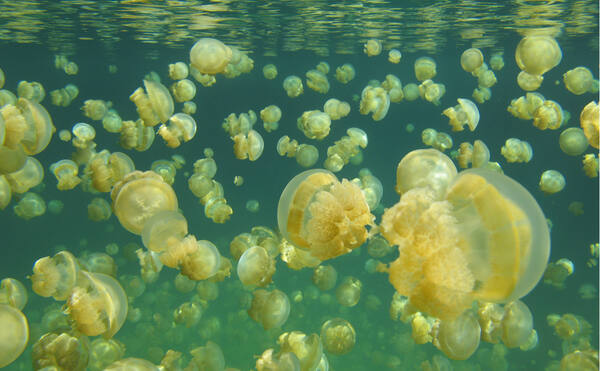Is the endemic golden jelly in Jellyfish Lake, Palau, threatened by sunscreen?

Objectives
Rock Islands Southern Lagoon in Palau has been inscribed on the World Heritage List in 2012. Among its values, the site harbours the highest concentration of marine lakes anywhere.
Palau has seen a dramatic increase in its visitors, now over 100,000 per year, and most of those visit Jellyfish Lake. In 2014, preliminary measurements of sunscreen compounds extracted from the endemic Mastigias jellyfish in Jellyfish Lake indicated that a low level of one compound, oxybenzone, was present. It was therefore imperative that further studies on the accumulation of sunscreen from tourists in Jellyfish Lake were undertaken.
The main objective of this project was to assess the extent of this possible contaminant in these important marine lake habitats. Additional marine lakes on the same island that are not used by tourists, as well as control lakes on a different island and the surrounding ocean would also be sampled, in order to put the results in perspective.
Results
All samples were collected on 15-16 January 2016 by the Coral Reef Research Foundation.
The results showed that sunscreen compounds or their transformation products (such as metabolites) were wide spread in Jellyfish Lake. Comparing different lakes and ocean/lagoon sites, Jellyfish Lake had also the highest levels of sunscreen compound concentrations. In general, water samples had low levels of sunscreen compounds, while jellyfish tissues and sediment had relatively higher levels of these compounds and metabolites. This was an indication of bioaccumulation of these chemicals.
The Golden Jellyfish medusa stage is relatively short lived, with a life span of about 6 months, but its benthic polyp stage, critical to its life cycle, could be affected by the presence of sunscreen chemicals.
Based on these findings, the experts recommended:
- the promotion of clothing for sun protection, to minimize the application of any sunscreen;
- the exclusive use of eco-friendly sunscreen, with the development of legislation to prohibit the use and importation of traditional sunscreen products.
Palau was the first country in the world to pass such a legislation.
This request was financed thanks to
a contribution from the Government of Finland.